北师大版英语九年级Unit 2 Books Lesson 5 The Book Club 教学设计
北师大版英语九年级全册Unit 2单词及短语

Unit 2 BooksGetting Ready名词Nouns1. comic连环画杂志e.g.: I saw the child reading a comic.2. classic名著e.g.: The novel may become a modern classic.3. bookshop 书店e.g.: I got this book by chance at a second-hand bookshop.形容词Adjectives1. how-to 提供指南的e.g.: There are plenty of recipes how-to videos and cooking classes available to anyone who has a computer, smartphone or television.Lesson 4 Classics名词Nouns1. adventure冒险,冒险经历e.g.: When you’re a child, life is one big adventure.2. wonderland仙境e.g.: Children find Lake George Village a wonderland of amusement parks.3. orphan孤儿e.g.: Tom is an orphan.4. curiosity好奇心e.g.: His curiosity and friendship with a boy named Huckleberry Finn often get him into trouble with his serious Aunt Polly.5. friendship友谊e.g.: Your friendship means a great deal to me.6. hole洞;孔e.g.: In the 1865 book, a young girl named Alice falls down a rabbit hole and drops into a strange land.7. character人物,角色e.g.: As she travels through the land, she meets many characters, solves puzzles and tries to avoid the awful Queen of Hearts.8. reader读者;电子阅读器e.g.: As they were so well hidden, many readers today still enjoy trying to find and solve these puzzles.9. society社会e.g.: As they wait for help, they try to live off the land and build a small society.10. thief贼,小偷e.g.: Two thieves stole the painting last night.11. preparation准备e.g.: What preparations have been done?动词Verbs1. publish 出版e.g.: At the time it was published, people weren’t used to this and it upset some people.2. remain仍然是,保持不变e.g.: It has remained a popular and important book since it was first published in 1876.3. steal偷,偷窃e.g.: We found out he’d been stealing from us for years.4. hang悬挂e.g.: Where are we supposed to hang our washing up to dry?形容词Adjectives1. silly 愚蠢的e.g.: The silly creatures in Alice’s Adventure in Wonderland were created by Lewis Carroll.2. bright聪明的;明亮的e.g.: Carroll was very bright and he had a degree in maths from Oxford.兼类词Words with Multiple Part of Speech1. fly n.苍蝇v.飞e.g.: Lord of the Flies was written by William Golding.2. drop v.落下n.滴;水珠e.g.: The climber slipped and dropped to his death.3. land n.陆地v.着陆e.g.: A fly land on his nose.4. force v.迫使,强迫n.力量e.g.: They are forced to stay on an island together after their plane has an accident.Lesson 5 The Book Club名词Nouns1. quotation引语,引文e.g.: The book began with a quotation from Goethe.2. advantage优势,有利条件e.g.: The man who doesn’t read good books has no advantage over the man who can’t read them.3. period一段时间,时期e.g.: This offer is available for a limited period only.动词Verbs1. form 养成,形成e.g.: Any book that helps a child to form a habit of reading, to make reading one of his deep and continuing needs, is good for him.2. depend取决于,决定于e.g.: Our future prosperity depends on economic growth.3. inspire激励;启发思考e.g.: The actors inspired the kids with their enthusiasm.形容词Adjectives1. inspiring 鼓舞人心的,激励人的e.g.: I’m happy that the books I wrote are inspiring.2. continuing连续不断的e.g.: We are grateful for your continuing support.3. well-known著名的,众所周知的e.g.: A well-known voice came over the airwaves.兼类词Words with Multiple Part of Speech1. need n.需求v.需要e.g.: It’s here if you need.短语Expressions1. a world of 大量的,无数的e.g.: They are waking up to a world of increasing shortages.2. depend on取决于;依靠e.g.: Does the quality of teaching depend on class size?Lesson 6 Tom Sawyer名词Nouns1. prediction预测e.g.: Was your prediction correct?2. painting刷油漆;绘画,油画e.g.: He has a wide knowledge of painting and music.3. artist艺术家e.g.: The artist combines different techniques in the same painting.4. move动作e.g.: Ben watched every move and became more and more interested.5. offer建议;主动提议e.g.: I accepted her offer to pay.6. paintbrush漆刷e.g.: Tom slowly gave Ben the paintbrush.动词Verbs1. focus 集中(注意力、精力等)e.g.: He focused on his painting like an artist.2. sweep轻轻擦e.g.: Tom swept his brush carefully back and forth, added a touch of paint here and there, and stopped to take a look at it all.3. consider仔细考虑;认为e.g.: Tom considered Ben’s offer.形容词Adjectives1. juicy 多汁的e.g.: As Tom started to paint Aunt Polly’s very long fence, along came Ben Rogers witha juicy apple in his hand.2. silent沉默的;安静的e.g.: Tom was silent.副词Adverbs1. carelessly 漫不经心地;粗心地e.g.: Tom kept painting and answered carelessly.2. honestly诚实地e.g.: I can’t believe he got that money honestly.3. eagerly热切地e.g.: Ben took the brush eagerly and started to paint.兼类词Words with Multiple Part of Speech1. paint v.在……上刷油漆n.油漆e.g.: Why don’t you let me paint a little?2. touch n.一点儿,少许;触觉v.触摸e.g.: I touched him lightly on the arm.3. regret n.遗憾v.感到遗憾e.g.: On Tom’s face was a look of regret but in his heart, he was satisfied.短语Expressions1. back and forth 反复来回e.g.: A bus shuttles passengers back and forth from the station to the terminal.2. take a look at看一下……e.g.: Take a look at that panda. It’s so cute.Communication Workshop名词Nouns1. lover爱好者e.g.: As a book lover, I’ve tried both paper books and e-books.2. aspect方面e.g.: The book aims to cover all aspects of city life.3. disadvantage不利因素e.g.: There are disadvantages to the plan.4. summary总结e.g.: The following is a summary of our conclusions.动词Verbs1. benefit 使受益e.g.: Compared with paper books, e-books benefit students in many aspects.形容词Adjectives1. extra 额外的e.g.: This adds extra cost.介词Prepositions1. unlike 不像,与……不同e.g.: Unlike paper books, you must read e-books on an e-book reader, a computer, or a smartphone.短语Expressions1. as long as 只要e.g.: In my opinion, it doesn’t matter which you use as long as it allows you to enjoy reading.。
「精品」九年级英语全册Unit2BooksLesson5TheBookClub教案新版北师大版
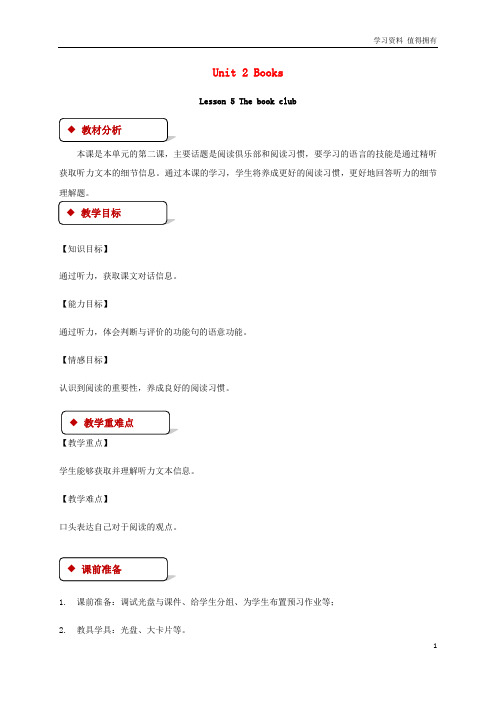
Unit 2 BooksLesson 5 The book club本课是本单元的第二课,主要话题是阅读俱乐部和阅读习惯,要学习的语言的技能是通过精听获取听力文本的细节信息。
通过本课的学习,学生将养成更好的阅读习惯,更好地回答听力的细节理解题。
【知识目标】通过听力,获取课文对话信息。
【能力目标】通过听力,体会判断与评价的功能句的语意功能。
【情感目标】认识到阅读的重要性,养成良好的阅读习惯。
【教学重点】学生能够获取并理解听力文本信息。
【教学难点】口头表达自己对于阅读的观点。
1. 课前准备:调试光盘与课件、给学生分组、为学生布置预习作业等;2. 教具学具:光盘、大卡片等。
Step1. BrainstormAsk Ss to discuss the genres of the books they usually readsStep2. Speaking1.Let students make conversation about their reading habit in pairs.Example:A: Do you like reading?B: Yes.A: What kind of books do you like to read?B: I like reading … .A: How often do you read?B: I read every night before sleeping.2. Get students to tell their opinions on the importance of reading to their partners. Step3. Reading1. Let students read the opinions represents in the text on Page 20.2. Match the quotations with the meanings.Step4. New wordsTeach the strange words appearing in the text.well-known advantage depend on inspireStep5. Listening1.Listen and answer: What are they talking about?Listen and tick the quotations that are mentioned.2.Listen again and answer the questions in the slide.3.Listen again and choose the best answer in exercise 5.4.Let students think over the reason why they use the quotations in the dialogue.Step6. Consolidation1.Read the listening material with the recorder.2.Read the listening material aloud together.3.Match the words with their corresponding meanings.4. Fill in the blanks according to the memory.5. Use the learned words to complete sentences.6. Let students fill in the information table orally in pairs.Step7. Language points1. inspiring adj. 鼓舞人心的;有激励作用的inspire v. 鼓舞;激励;赋予灵感;启迪2. rather adv. 宁愿/不愿;宁可/宁可不rather 做该义时,放在实意动词前3. form v. 形成;构成;组织;塑造form a habit 形成习惯Step8. Speaking你听完对Peter和Sandra的采访后,觉得他们的观点很有意思,你想把这件事告诉你的英国的朋友。
北师大版初中英语九年级上册Unit 2 Books 词汇精讲

Unit 2 Books词句精讲精练:【词汇精讲】1. be used tobe used to 意为“习惯于……”,to 是介词,其后可接名词、代词或动词-ing形式作宾语。
be used to doing something意思是“习惯于做某事”。
例如:He is a movie star. He is used to a lot of attention from his fans.他是一个电影明星,他习惯了受到粉丝们的众多关注。
My father is used to living in the village.我爸爸习惯于住在小山村。
【拓展】(1)be used to do something意思是“被用来做某事”,是动词短语use…to do的被动语态结构。
例如:Knives are used to cut things. 小刀是用来切东西的。
(2)used to do sth是一个固定结构,意思是“过去经常做某事”,后面用动词原形,表示过去的某种经常性、习惯性的行为或者动作,并意味着这种动作目前已经不存在。
例如:肯定句:I used to play with my friends after school. 过去放学后我常常和朋友们一起玩。
否定句:You didn’t use to like pop songs. = You usedn’t to like pop songs.你过去常常不喜欢流行歌曲。
一般疑问句:Did your sister use to be quiet? = Used your sister to be quiet?你的妹妹过去常常是很安静吗?there be句式:There used to be a lot of fishes in this river. 过去这条小河常常有许多鱼。
2. proudproud 是形容词,常用结构:be proud of sth. 意为“以……而骄傲;为……而自豪”。
北师大版英语九年级Unit 2 Books Lesson 5 The Book Club课件
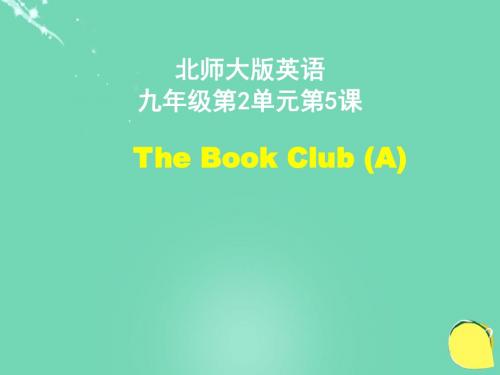
3 “Today a reader, tomorrow a leader.” Quotation 引用的话
4 “The man who doesn’t read good books has no advantage over the man who can’t read them.”
Match the quotations with the meanings
fairy tales
detectives tories comics book cook books science books
history stories
travel books
Ask and Answer
• • • • • • A: Do you like reading? B: Yes. A: What kind of books do you like to read? B: I like reading … . A: How often do you read? B: I read every night before sleeping.
Homework 1. Listen to the recording and read the text aloud three times. 2. Please write down the oral task in your homework book.
北师大版英语 九年级第2单元第5课
The Book Club (B)
• 学习目标
• 在本课结束时,学生能够
• 1. 通过复习听力内容,获取表达判断和
评价的表达方式;
• 2. 围绕本课“reading books”的话题, • 进行表达判断与评价的对话。
北师大版九年级全一册《Lesson_5_The_Book_Club》2022年(有答案)同步练习卷

北师大版九年级全一册《Lesson 5 The Book Club》2022年(有答案)同步练习卷一、单项选择1. In the past few years,thousands of films _____ all over the world.()A.have producedB.have been producedC.are producingD.are being produced2. A lot of tall buildings ________ in his hometown in the last three years.()A.have set upB.have been set upC.were set upD.set up3. The boy ________ his dictionary when he came into the classroom.()A.forgotB.droppedC.leftD.fell4. May I ________ your new MP4?()A.have a look inB.have a look atC.lookingD.have look at5. ________ you tell the truth, I'll try to help you.()A.AlthoughB.ThoughC.As long asD.Why二、单词拼写We have been friends for many years. I hope our f________ will last forever.The young man is standing in the rain and his clothes are wet. Maybe he is a little bits________.A thief ________ (偷)some money and things from the shop last night.The elephant is the biggest animal on l________.Living in the city has many a________ such as good schools, big shopping centers and so on.三、翻译填空我认为年轻人应该把更多的注意力集中在工作上.I think young people should________more________their work.人们将永远记住那小女孩身处危险时的甜美微笑.(词数不限)The little girl________ forever by people for her sweet smile when she was in danger.在中国到处都有人打羽毛球.In China,badminton________everywhere.你的学习取决于你努力的程度.Your success________ how hard you work at your lessons.它们会在互联网上被其他班级看到.They________ on the Internet________ other classes.四、阅读表达The holiday is coming to us.Finally,after months of study,you have some time to yourself.So,why not read a book?Well,some people will say,"Why do you like reading books?We have Internet.It offers a lot of more colorful fun.Books arehistory!"But I am sure you can learn a lot from books than Internet.One clear reason is that a well﹣chosen book can give you a lot of wonderful words,as long as you have a good dictionary,of course.Believe me,it's far easier to get new words from a book or an article than it is from the TV or the Internet.But another more important point is that books give you something that the Internet can not.The general webpage (网页) is picture﹣heavy and the text is as easy to read as possible.While"easy"may attract (吸引) you,unluckily it's not helpful for any long﹣term development of reading skills and the general language level.Because of that,reaing on the Internet can't take the place of reading books.But perhaps the best reason is that just choosing what you read and doing it independently means that it's something you do by and for yourself.You can choose what you want to read.It's hard work,but you'll find that what once seemed like a duty is now a pleasure.(1)Does the writer advise people to read books in their holidays?________(2)What can people get from a well﹣chosen book?________(3)What's the general webpage like?________(4)How many reasons for reading a book does the writer mention in the passage?________(5)What does the writer want to tell us in the passage?________.五、阅读理解When you carry your heavy schoolbag on the way to school or home, do you know the fact that the heavy schoolbag influences your interest in learning knowledge? Don't worry. You may be able to say goodbye to your heavy schoolbag in the near future.Instead of burying(埋葬) your face in an ocean of textbooks, newspapers, magazines and novels, you will soon find that an E﹣book reader can take the place of them all.An E﹣book reader is a new kind of mini machine designed to hold thousands of text files and display them on the screen as real text printed(印刷) on a paper page.In the same way in which the iPod(a kind of MP3)has changed the way people enjoy music, E﹣book readers could change the way that books are read. Some scientists haveThe size of an E﹣book reader is the same as that of real books. Its screen is different from that of a computer. It is as thin as a piece of paper. The words on an E﹣book reader's screen look exactly the same as those on real pages. However, you can do more with an E﹣book reader than you can with a real book. The reader can change the size of the words and connect to the Internet to download new books.(1)Which of the following is TRUE about an E﹣book reader?________A. It makes us lose interest in learning knowledgeB. An E﹣book reader can display text files as clearly as real text printed on a paper pageC. An E﹣book reader is not large enough to hold thousands of text filesD. An E﹣book reader is as large as a computer.(2)What are the differences between an E﹣book and a real book?________A. An E﹣book is much thicker than a real bookB. The real book can change the size of the words, but the E﹣book reader can notC. The E﹣book reader can not download new books from the Internet, but the real book canD. A real book is not so useful as an E﹣book reader.(3)The screen of an E﹣book reader looks like________.A. an MP3playerB. a blackboardC. a piece of paperD. a tape.(4)We can infer(推断) from the passage that________.A. the heavy schoolbag is bad for students' healthB. the size of an E﹣book reader is the same as the iPodC. the screen of an E﹣book reader is as thin as a piece of paperD. E﹣books will take the place of textbooks, not newspapers, magazines or novels.参考答案与试题解析北师大版九年级全一册《Lesson 5 The Book Club》2022年(有答案)同步练习卷一、单项选择1.【答案】B【考点】现在完成时的被动语态【解析】在过去的几年里,全世界数千部电影被制作.【解答】答案:B 根据in the past few years可知,这是现在完成时的标志,所以此处应使用现在完成时态.又知thousands of films是动词produce(制作)的承受者,二者属于被动关系,所以此处应用现在完成时的被动语态,其结构为have/has been+过去分词;又知films是复数,所以此处应用have been produced.故选B.2.【答案】B【考点】现在完成时的被动语态【解析】在最近三年里小镇上建起了很多高楼.【解答】考查现在完成时的被动语态.根据题干有in the last three years,可知要用现在完成时,楼是被建起的,所以用现在完成时的被动语态,结构为have\has been done.故选:B.3.【答案】B【考点】动词辨析【解析】这个男孩当他走进教室的时候把他的字典掉在了地上.【解答】选项A:忘记,选项B:drop 表示降落,落下时,是及物动词,选项C:离开,选项D:表示落下,是不及物动词,后面不跟宾语.结合句意:这个男孩当他走进教室的时候把他的字典掉在了地上.故选:B.4.【答案】【考点】其他动词短语【解析】我可以看看你的新的MP4吗?【解答】have a look at看一看……,是固定词组,这是情态动词May引导的句子,后面动词应该是动词原形.结合句意:我可以看看你的新的MP4吗?故选:B.5.【答案】C【考点】条件状语从句【解析】只要你说实话,我会尽力帮助你的.【解答】选项A:虽然,选项B:虽然,选项C:只要,选项D:为什么,结合句意:只要你说实话,我会尽力帮助你的.故选:C.二、单词拼写【答案】riendship【考点】根据提示填单词(单句)【解析】我们是多年的朋友,我希望我们的友谊能永远持续下去.【解答】考查名词.结合语境"我们是多年的朋友,我希望我们的__能永远持续下去"及首字母提示,可知,应该是"友谊".填不可数名词.故答案是:friendship.【答案】illy【考点】根据提示填单词(单句)【解析】那个年轻人站在雨中,衣服都湿了.也许他有点傻.【解答】考查形容词.结合语境"那个年轻人站在雨中,衣服都湿了.也许他有点__"及首字母提示,可知,应该是"傻的".系表结构,填形容词silly.故答案是:silly.【答案】stole【考点】根据提示填单词(单句)昨晚一个小偷从商店偷了一些钱和东西.【解答】考查动词.结合语境"昨晚一个小偷从商店__了一些钱和东西"及首字母提示,可知,应该是"偷"steal.由last night昨晚,可知,一般过去时态,谓语动词用过去式stole.故答案是:stole.【答案】and【考点】根据提示填单词(单句)【解析】大象是陆地上最大的动物.【解答】考查名词.结合语境"大象是___上最大的动物"及首字母提示,可知,应该是"陆地".填不可数名词.故答案是:land.【答案】dvantages【考点】根据提示填单词(单句)【解析】住在城里有很多优点,比如好学校,大购物中心等等.【解答】考查名词复数.结合语境"住在城里有很多__,比如好学校,大购物中心等等"及首字母提示,可知,应该是"优点"advantage.many许多,修饰可数名词复数.故答案是:advantages.三、翻译填空【答案】concentrate/focus,on【考点】根据提示填单词(单句)【解析】首先要认真阅读英语句子,然后和汉语句子进行比对,缺失部分的部分是一个动词短语"注意力集中",根据提示选择合适的短语或词语进行填空.【解答】答案concentrate/focus on 根据"should ____more____ their work"与汉语提示对比后,可知空格处需要填的是"集中",注意力集中常用concentrate/focus on,又根据should,可知后面有填动词原形,故填concentrate/focus on.【答案】will be remembered【考点】汉译英【解析】The little girl will be remembered forever by people for her sweet smile when she was in danger.记住remember,根据句意可知,主语和动词是被动关系,要用一般将来时的被动语态,其构成为will be done.故答案为will be remembered.【答案】isplayed【考点】汉译英【解析】is played.【解答】答案:is played.这里是说客观事实用一般现在时,主语badminton是动词play的承受者,构成被动关系,故用一般现在时的被动语态am/is/are+过去分词,主语badminton是三单,故is,play的过去分词是played,故答案是is played.【答案】depends on【考点】根据提示填单词(单句)【解析】根据句意,句子中缺少一个固定短语depends on,取决于.【解答】答案:depends on.该题考查学生"短语depend on的掌握;取决于,depend on;在这里success是一个不可数名词,此句为一般现在时,后面所跟的动词应该用第三人称单数形式,即在depend的后面直接加s.故填depends on.【答案】will be seen,by【考点】汉译英【解析】They will be seen on the Internet by other classes.【解答】看到see,根据句意可知,要用一般将来时的被动语态,其构成为will be done,被某人by sb..故答案为will be seen;by.四、阅读表达【答案】Yes,Alotofwords,It's picture﹣heavy and the text is as easy to read as possible,Three,The reasons why we read a book/books【考点】人生感悟类阅读回答问题型日常生活类阅读【解析】文章大意;主要描述了在网络时代作者仍然要看纸质书,感受其中的妙趣,并从中学【解答】1题答案:Yes考查细节理解题,根据文中的第一段It offers a lot of more colorful fun.Books are history可知作者建议读书,故答案是Yes.2题答案:A lot of words考查细节理解题,根据文中的第二段One clear reason is that a well﹣chosen book can give you a lot of wonderful words可知能学一些词,故答案是A lot of words.3题答案:It's picture﹣heavy and the text is as easy to read as possible考查细节理解题,根据文中的第二段Believe me,it's far easier to get new words from a book or an article than it is from the TV or the Internet.可知相信我,从书本或文章中获取新单词比从电视或网络中获取新单词要容易得多,故答案是It's picture﹣heavy and the text is as easy to read as possible.4题答案:Three考查归纳题,根据文中的One clear reason is that a well﹣chosen book can give you a lot of wonderful words;But another more important point is that books give you something that the Internet can not;But perhaps the best reason is that just choosing what you read and doing it independently means that it's something you do by and for yourself可知是三个,故答案是Three.5题答案:The reasons why we read a book/books考查主旨题,根据文中的大意主要描述了在网络时代作者仍然要看纸质书,感受其中的妙趣,并从中学习.为什么读书,故答案是The reasons why we read a book/books.五、阅读理解【答案】BDCC【考点】科普知识类阅读【解析】短文讲了电子书阅读器将会取代课本、报纸、杂志和小说等书籍,详细的介绍了电子书阅读器的形状,大小和功能等.【解答】(1) B 细节判断题.根据第三段句子An E﹣book reader is a new kind of mini machine designed to hold thousands of text files and display them on the screen as real text printed (印刷) on a paper page.电子书阅读器是一种新型迷你机器,它被设计成能容纳数千个文本文件,并在屏幕上显示成纸页上的真实文本.可知电子书阅读器可以像在纸上打印的真实文本一样清晰地显示文本文件.故选B.(2) D 细节理解题.根据最后一段句子 However, you can do more with an E﹣book reader than you can with a real book.然而,使用电子书阅读器比使用电子书阅读器能做的更多.可知真正的书不如电子书阅读器有用.故选D.(3) C 细节理解题.根据最后一段句子 Its screen is different from that of a computer. It is as thin as a piece of paper.它的屏幕与电脑的屏幕不同.它像纸一样薄.可知电子书阅读器的屏幕看起来像一张纸.故选C.(4) C 细节推理题.根据最后一段句子 Its screen is different from that of a computer. It is as thin as a piece of paper.它的屏幕与电脑的屏幕不同.它像纸一样薄.可知从文章我们知道电子书阅读器的屏幕像纸一样薄.故选C.。
初三英语(师大版)U2 Lesson 5 The Book Club 2-3学习任务单

plete the sentence. Use these words.(见教材P126,练习A)
【学习任务二】
1.Discuss with partner. What do you think the quotations?(见教材P21,练习7)
2.Read the reading journal. Match the paragraph with the paragraph headings.(见教材
课程基本信息课ຫໍສະໝຸດ 编号学科英语年级
初三
学期
秋季
课题
U2 Lesson 5 The Book Club 2
教科书
书名:英语
出版社:北京师范大学出版社出版日期: 2015年7 月
学生信息
姓名
学校
班级
学号
学习目标
1.能够在语境中理解并准确运用词汇;
2.能够理解本课表达“判断与评价”的语句的使用功能,并能够在讨论中运用;
3.推荐一部好书并阐明理由。
课前学习任务
朗读Lesson 5的词汇及对话,关注词汇发音和意义及对话内容。
课上学习任务
【学习任务一】
1.Match the words with their meanings.
quotation激励人的
well-known引语
inspiring著名的
form连续不断的
advantage养成
P127,Reading)
3.Share your ideas with partner.
Recommend a good book that you read:
1). What book is it?
北师大版九年级Unit2 Books—Lesson 5 The Book Club教案
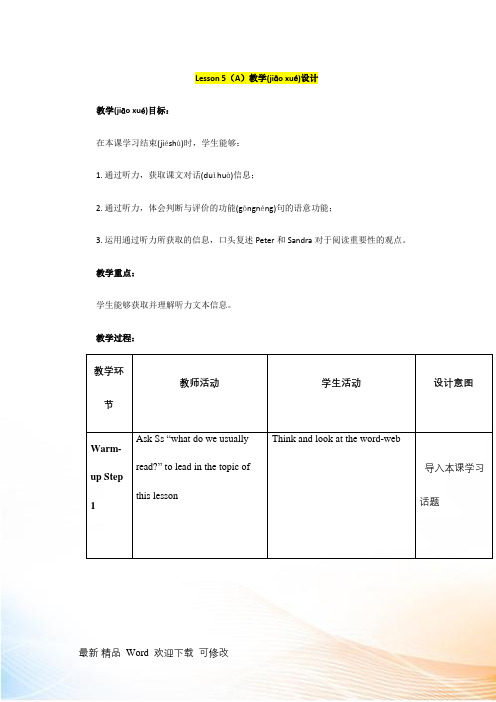
Lesson 5(A)教学(jiāo xué)设计教学(jiāo xué)目标:在本课学习结束(jiéshù)时,学生能够:1. 通过听力,获取课文对话(duìhuà)信息;2. 通过听力,体会判断与评价的功能(gōngnéng)句的语意功能;3. 运用通过听力所获取的信息,口头复述Peter和Sandra对于阅读重要性的观点。
教学重点:学生能够获取并理解听力文本信息。
教学过程:教学环节教师活动学生活动设计意图Warm-up Step 1 Ask Ss “what do we usuallyread?” to lead in the topic ofthis lessonThink and look at the word-web导入本课学习话题Step 2Show an example dialogue forSs to follow, guide them to talkabout their reading habitsShow a question about readingto guide Ss to discuss in pairs Ask and answer, have a shortdialogueHave a short discussion引导学生热身,口头讨论本课话题Before -listening Step3 Show 4 quotations aboutreadingGo through them with the SsLet Ss do Ex2Read through the 4 quotations andfind out their meaning为听力做词汇话题方面的准备While -listening Step4 1st listeningPlay tape once or twiceCheck the answersListen and answer: What are theytalking about?Listen and tick the quotations thatare mentionedShow their answers1听获取对话大意并选出对话用到的quotationsStep52nd listeningShow 4 questionsGo through the questions with SsPlay tape one or twiceCheck answers Go through the questionsListen and find out answersAnswer the 4 questions2听,捕捉信息回答问题Step63rd listeningShow 3 multiple choices exercise for Ss to do , then play the tape againCheck answers Listen and do the exerciseShow their answers and check3听,完成关于细节信息的选择题Post -listening Step7 Let Ss read the tapescript withthe recorder。
北师大版英语九年级Unit 2 Books Lesson 5 The Book Club 教学设计

北师大版英语九年级Unit 2 Books Lesson 5 The Book Club 教学设计一. 教材分析北师大版英语九年级Unit 2 Books Lesson 5 The Book Club主要介绍了关于俱乐部的内容。
通过本节课的学习,学生将了解俱乐部的类型、活动以及如何加入俱乐部。
教材以真实的情景和丰富的文化背景为依托,引导学生探讨和分享自己的兴趣和爱好,提高他们的语言运用能力和跨文化交际能力。
二. 学情分析九年级的学生已经具备了一定的英语基础,能够运用英语进行简单的交流。
但他们在阅读理解、词汇运用和口语表达方面还存在一定的困难。
因此,在教学过程中,教师需要关注学生的个体差异,充分调动他们的学习积极性,引导他们主动参与课堂活动。
三. 教学目标1.知识目标:–学生能够掌握有关俱乐部的基本词汇和表达方式。
–学生能够理解教材中的对话和短文,掌握其中的关键信息。
2.能力目标:–学生能够用英语介绍自己的兴趣和爱好,并能与他人进行相关话题的讨论。
–学生能够在真实情境中运用所学知识进行交流和表达。
3.情感目标:–学生能够培养对英语学习的兴趣,提高自信心。
–学生能够学会尊重他人的兴趣和爱好,形成良好的团队合作精神。
四. 教学重难点•学生能够掌握有关俱乐部的基本词汇和表达方式。
•学生能够理解教材中的对话和短文,掌握其中的关键信息。
•学生能够在真实情境中运用所学知识进行交流和表达。
•学生能够用英语介绍自己的兴趣和爱好,并能与他人进行相关话题的讨论。
五. 教学方法1.任务型教学法:通过设置具有实际意义的任务,引导学生参与课堂活动,提高他们的语言运用能力。
2.情境教学法:创设真实的情境,让学生在特定的环境中学习和运用英语。
3.合作学习法:鼓励学生分组讨论和合作完成任务,培养他们的团队精神和沟通能力。
六. 教学准备1.教材:北师大版英语九年级Unit 2 Books Lesson 5 The Book Club。
北师大版九年级英语全一册:Lesson 5 The Book Club 学案设计(无答案)
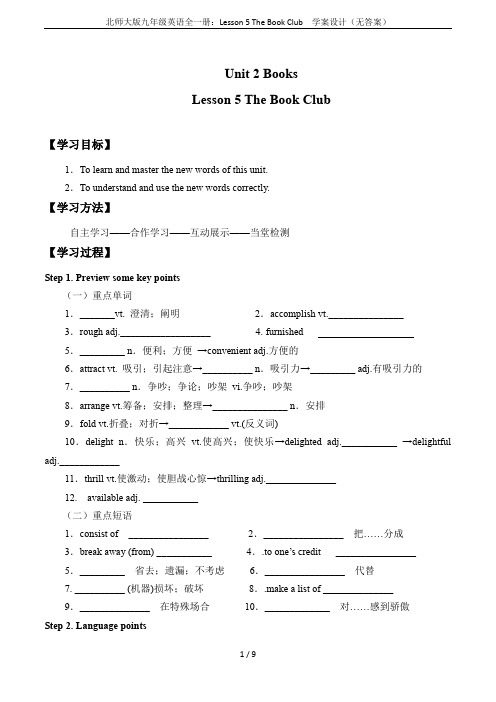
Unit 2 BooksLesson 5 The Book Club【学习目标】1.To learn and master the new words of this unit.2.To understand and use the new words correctly.【学习方法】自主学习——合作学习——互动展示——当堂检测【学习过程】Step 1. Preview some key points(一)重点单词1._______vt. 澄清;阐明2.accomplish vt._______________3.rough adj.__________________ 4. furnished5._________ n.便利;方便→convenient adj.方便的6.attract vt. 吸引;引起注意→__________ n.吸引力→_________ adj.有吸引力的7.__________ n.争吵;争论;吵架vi.争吵;吵架8.arrange vt.筹备;安排;整理→_______________ n.安排9.fold vt.折叠;对折→____________ vt.(反义词)10.delight n.快乐;高兴vt.使高兴;使快乐→delighted adj.___________ →delightful adj.____________11.thrill vt.使激动;使胆战心惊→thrilling adj.______________12. available adj. ___________(二)重点短语1.consist of________________ 2.________________ 把……分成3.break away (from) ___________ 4..to one’s credit ________________5._________ 省去;遗漏;不考虑6.________________ 代替7. __________ (机器)损坏;破坏8..make a list of ______________9.______________ 在特殊场合10._____________ 对……感到骄傲Step 2. Language points1.consist vi. ______________; adj. _________________[归纳拓展] 请诵读并体会以下例句,并归纳该单词用法。
九年级英语全册 unitbooks lessonthe book club初中九年级全册英语

2021/12/12
inspiring激励( 人的 jīlì)
inspired受到激励的
第九页,共三十五页。
鼓励(gǔlì),激励
Listening
1st: Listen and answer: What are they talking about?
Listen and tick the quotations that are mentioned.
著名 的 (zhùmíng)
American writer. Lots of people know him and like his books.
优势 ,优 (yōushì) 点
2021/12/12
The advantage of a fridge is that it can keep food fresh for a longer time.
inspire them to join our career.
2021/12/12
第二十四页,共三十五页。
2.rather adv. 宁愿/不愿;宁可/宁可不 e.g. If it's all the same to you, I'd rather work at home rather 做该义时,放在实意(shíyì)动词前
第八页,共三十五页。
His success depends on his hard work.
依靠 ,依 (yīkào) 赖
When I meet difficulties in life, my mother always gives me ideas and advice, she can always inspire me to walk on.
Unit2Lesson5TheBooks教学设计九年级英语北师大版全一册
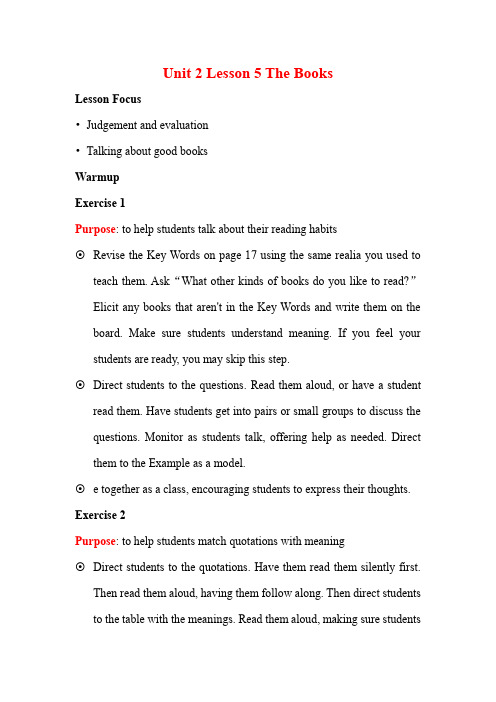
Unit 2 Lesson 5 The BooksLesson Focus•Judgement and evaluation•Talking about good booksWarmupExercise 1Purpose: to help students talk about their reading habitsRevise the Key Words on page 17 using the same realia you used to teach them. Ask“What other kinds of books do you like to read?”Elicit any books that aren't in the Key Words and write them on the board. Make sure students understand meaning. If you feel your students are ready, you may skip this step.Direct students to the questions. Read them aloud, or have a student read them. Have students get into pairs or small groups to discuss the questions. Monitor as students talk, offering help as needed. Direct them to the Example as a model.e together as a class, encouraging students to express their thoughts. Exercise 2Purpose: to help students match quotations with meaningDirect students to the quotations. Have them read them silently first.Then read them aloud, having them follow along. Then direct students to the table with the meanings. Read them aloud, making sure studentsunderstand meaning. Say“Now match the quotations with the meanings”. Monitor, offering help as needed. If students need support, have them work in pairs.Go over the answers, asking individual stud. ents to say them aloud.Encourage students to answer in plete sentences.Answers1, 3, 4, 2ListeningExercise 3Purpose: to help students identify quotations heard in a listeningDirect students to the quotations. Say " Read the quotations again. Then listen to the inter. view and tick those that are mentioned" Play the interview. Monitor, offering help as needed. Play the interview again if necessary.Go over the answers, asking individual students to say them aloud. Answers1, 4Expansion: Who Said It?Challenge students to listen closely and say the writer who said each quote ( Mark Twain and Arthur C. Clark). Have them research who said the other two quotes in the book (Margaret Fuller and Maya Angelou). Then have them find out some information on each person, for example, when he orshe lived and died, where he or she was from, and what some of his or her famous books or writings were. Encourage students to choose one of the books or pieces of writing that interests them and to read it. Or they can find and read a biography about any of the figures.Exercise 4Purpose: to help students answer questions based on a listeningDirect students to the questions. Read them aloud, or have a student read them. Say““Let's listen again and answer the questions”. Play the interview again. Monitor, offering assistance as needed.Go over the answers, first having students pare with a partner. Then ask individual students to read the answers aloud. Encourage students to answer in plete sentences.Answers1. The Book Club,2. Sandra White is a writer and Peter Johnson is an English teacher,3. How important reading is, and what a good book is,4. Answers will vary.Exercise 5Purpose: to help students choose the correct answer based on a listening Direct students to the sentences. Have students read them silently. Go over anything your students may not understand, for example, the vocabulary host, clever and inspiring. Then say "Listen again andchoose the best answer". Play the interview again, monitoring as students choose the best answer.Go over the answers, having students first pare their answers with a partner. Then have individual students read the sentences aloud. Answers1. а,2. с,3. с,4. bExpansion: Mix It Up!Have students do the exercise first, before playing the recording, and then play the interview for them to check.Exercise 6Purpose: to help students know words to describe judgement and evaluationDiagnostically assess what your students know. Ask "What does judgement mean?" See what students say. Accept any reasonable answers. Then ask " What does it mean to evaluate something?" Again, accept any reasonable answers. If students understand, move on; if not, have two students each look up a word in the dictionary. (judgement: an opinion or conclusion about something; evaluate: to form an idea ).If you feel your students are ready, you may skip this step.Direct students to the Key Expressions. Read them aloud, or have a student read them. Say“Let's listen to the Key Expressions in context again. Pay attention to the sentences that e before and after the KeyExpressions”. Play the interview again. Pause after Peter says, ““That's true. Twain was a very wise man”, and ask“What question did the host ask Peter?”Elicit What do you think, Peter? Write What do you think? on the board. Explain that the first thing one must do to get another's judgement or evaluation on a topic is asking,“What do you think?”Play the recording, stopping after Well, not all books help people learn. Ask " What did Peter say that Susan responded to?" Elicit or provide They can all help people learn.Expansion: Have a Debate!Note: Use this activity with more proficient students. Teach students more language for evaluating information:TO AGREE:Absolutely. / Definitely.I couldn't agree more.TO DISAGREE:I see your point, but I don't know.Well, not in my opinion.I'm afraid I disagree.That's not always true.TO PROMISE:Well, it depends.I suppose so, but…Yes, but that's not always the case.Maybe, but I'm still not so sure.Then have a debate in class. Think of some“controversial topics,”for example, Should the schoolyear be extended to twelve months? Should grades be based solely on exams? Should there be an age limit for cellphone use? Have students form small groups to discuss these topics, using the new language. Don't worry so much about accuracy; just let students express themselves.SpeakingExercise 7Purpose: to help students express opinions about quotations“What do you think of the quotations? Do you agree with them?”Have students get into pairs. Say“Share your opinions with your partner”. Refer students to the Key Expressions and read the Example aloud, if necessary. Monitor, offering help as needed. Check students' pronunciation of the Key Expressions.e together as a class. Have a few students share their partners' or theirown opinions.Exercise 8Purpose: to help students talk about what kinds of books are good books Ask“What does Sandra say good books are?”Elicit the answer, or if necessary, play the recording beginning with the host's line“How do we know if we're reading a good book or not?”and stop after Sandrasays, ““Good books are inspiring”. If you feel your students are ready, you may skip this step.Ask“In your opinion, what kinds of books are good books?”Have students get into pairs and say, ““Talk with your partner. Give examples if possible”. Read the Example aloud, it necessary. Monitor as students ask and answer questions, offering help as needed. Refer students to the Key Expressions as they discuss their opinions. Make note of any serious errors and have a feedback session at the end of the activity.For more practice, have students form new pairs.Exercise 9Purpose: to help students express opinions about readingHave students volunteer to e to the front of the class and share their own opinions. Read the Example aloud, if necessary.Expansion: Keep Talking !Note: Use this activity to give students more practice. Write more quotations about reading on the board or on pieces of paper to hang up in the classroom. Have students continue the conversation, making judgements and expressing opinions on the quotations. Here are a few quotations that your students might enjoy talking about:Either write something worth reading or do something worth writing.——Benjamin Franklin If one cannot enjoy reading a book over and over again, there is no pointin reading it at all.——Oscar Wilde There are worse crimes than burning of them is not reading them.——Ray Bradbury The worst thing about new books is they keep us from reading the old ones.——John Wooden Encourage your students to learn more about the authors quoted here.If time allows, do Workbook pages 126 and 127 in class. Alternatively, assign for homework.。
北师大版英语九年级全册【教学课件】Unit 2 Lesson 5
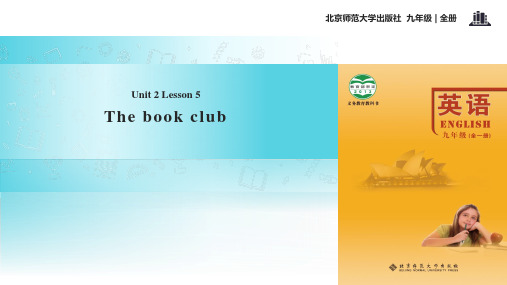
北京师范大学出版社 九年级 | 全册
1 What’s the programme’s name?
The Book Club.
2 What do the guests do for a living? Sandra is a writer and Peter is a teacher.
北京师范大学出版社 九年级 | 全册
北京师范大学出版社 九年级 | 全册
Listening
1st: Listen and answer: What are they talking about? Listen and tick the quotations that are mentioned.
Quotations
mentioned
北京师范大学出版社 九年级 | 全册
3 “Today a reader, tomorrow a leader.” Quotation 引 用的话 4 “The man who doesn’t read good books has no advantage over the man who can’t read them.”
北京师范大学出版社 九年级 | 全册
Unit 2 Lesson 5
The book club
北京师范大学出版社 九年级 | 全册
Brainstorm
What do we usually read?
fairy tales detectives tories history stories comics science books cook books
北京师范大学出版社 九年级 | 全册
His success depends on his hard work. 依靠,依赖 When I meet difficulties in life, my mother always gives me ideas and advice, she can always inspire me to walk on. inspiring激励人的 inspired受到激励的 鼓励,激励
- 1、下载文档前请自行甄别文档内容的完整性,平台不提供额外的编辑、内容补充、找答案等附加服务。
- 2、"仅部分预览"的文档,不可在线预览部分如存在完整性等问题,可反馈申请退款(可完整预览的文档不适用该条件!)。
- 3、如文档侵犯您的权益,请联系客服反馈,我们会尽快为您处理(人工客服工作时间:9:00-18:30)。
名师精编优秀教案
Lesson 5(A)教学设计
教学目标:
在本课学习结束时,学生能够:
1. 通过听力,获取课文对话信息;
2. 通过听力,体会判断与评价的功能句的语意功能;
3. 运用通过听力所获取的信息,口头复述Peter和Sandra对于阅读重要性的观点。
教学重点:
学生能够获取并理解听力文本信息。
教学过程:
Lesson 5(B)教学设计教学目标:
在本课学习结束时,学生能够:
1. 通过复习听力内容,获取表达判断和评价的表达方式;
2. 围绕本课“reading books”的话题,进行表达判断与评价的对话。
教学重点:进行表达评价的对话
教学难点:口头表达自己对于阅读的观点。
教学过程:
名师精编优秀教案。
